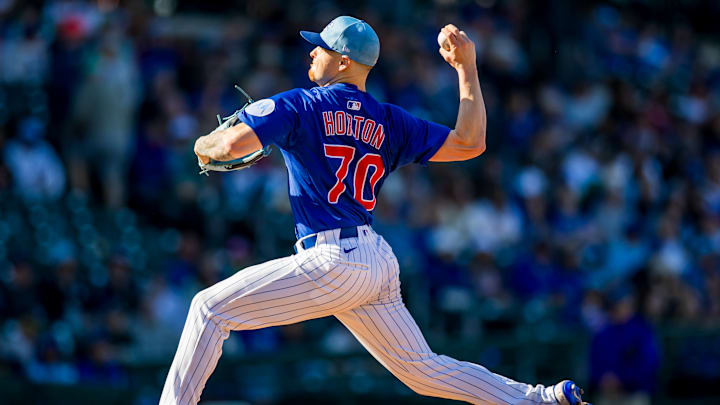Top Chicago Cubs pitching prospect Cade Horton has been called up from Triple-A Iowa, where he’s been pitching with stuff meant for the big leagues, posting a 1.24 ERA with 33 strikeouts over 29 innings. Horton has been activated for Saturday’s night game against the New York Mets in Queens, and the anticipation is palpable in Chicago. Excitement for a homegrown arm (MLB Pipeline’s No. 2 Cubs prospect) with this kind of upside and buzz has not come around often.
Horton is widely regarded as the most complete pitching prospect the Cubs have developed in more than 15 years. Then why, you may ask, is he not making his debut as a starter?
After the Cubs' 7-2 loss to the Mets in the Friday night series opener, Counsell said that Brad Keller, who has been exclusively a reliever for Chicago, will start Saturday's game. Horton will be an option to pitch behind Keller, but they’re “essentially running a bullpen game,” Counsell said.
Craig Counsell on tomorrow's starting pitcher: "(Brad) Keller's gonna be the starter. Cade will be active, but we're essentially running a bullpen game." pic.twitter.com/RE7BMKLGPk
— Marquee Sports Network (@WatchMarquee) May 10, 2025
Sure, it’s a calculated development move by Counsell, and it makes sense on paper. But it definitely comes with some risk, and it’s certainly toeing the line between smart roster management and getting too cute with a debut.
Cubs’ Cade Horton approach could be getting too cute
Keller has been an effective multi-inning reliever, and while he hasn’t started a game for the Cubs, he’s capable of giving two or three solid innings to open things up. The gamesmanship of it all makes sense: Keller starting means he’s facing the Mets’ (very dangerous) top of the order and taking a bit of the pressure off Horton.
It's logical. Counsell is shielding a top prospect from immediate pressure, maximizing matchups and potentially managing expectations. Maybe it's a developmental hedge.
But routine matters, and starting is all Horton has ever done. Shifting him into a reliever’s role for his major league debut changes everything, including preparation, timing, mental build-up. Does he know exactly when he’s entering the game? No, neither do we. And even seasoned arms are thrown off with that uncertainly. For a 22-year-old stepping onto a big-league mound for the first time, that can be a tough adjustment.
There’s also the emotional side. The adrenaline, nerves, mental load of a major league debut is not something to ignore. We're asking a hot pitcher not to overthink his manager using an opener.
Taking Horton out of the structured start he’s trained for and throwing him into a flexible bullpen slot adds volatility. Counsell is asking him to stay loose, stay ready and still bring his best stuff without a traditional starter’s runway. That’s not a small ask.
In the minors, Horton’s been capped around 70 pitches. Let’s say Keller runs into trouble early. Horton could be asked to cover more than planned, or the bullpen could get stretched even thinner. There’s not a ton of wiggle room here, in a game that Counsell is calling a literal “bullpen game.”
Horton was a high first-round draft pick, selected seventh overall in 2022. He’s formidable and highly anticipated, and I wonder if this decision dilutes his debut? It does take a little shine off the moment, doesn’t it? Calling it a bullpen game changes the tone enough that it feels like a debut with an asterisk. But maybe that doesn't matter.
Counsell’s reasoning is sound. He’s trying to protect his young arm from facing elite bats right out of the gate. It could be smart … if it works.
